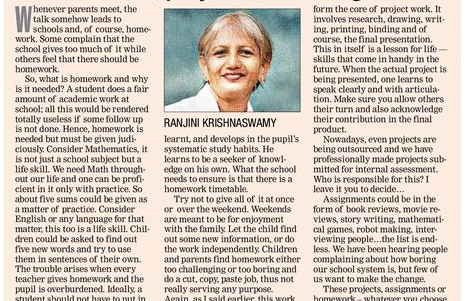Let children do it themselves. Don’t help them. It may not be perfect; but at least they will learn to be independent.
Whenever parents meet, the talk somehow leads to schools and, of course, homework. Some complain that the school gives too much of it while others feel that there should be homework.
So, what is homework and why is it needed? A student does a fair amount of academic work at school; all this would be rendered totally useless if some follow up is not done. Hence, homework is needed but must be given judiciously. Consider Mathematics, it is not just a school subject but a life skill. We need Math throughout our life and one can be proficient in it only with practice. So about five sums could be given as a matter of practice. Consider English or any language for that matter, this too is a life skill. Children could be asked to find out five new words and try to use them in sentences of their own. The trouble arises when every teacher gives homework and the pupil is overburdened. Ideally, a student should not have to put in more than a maximum of half hour to one hour of work after school. His interaction in school should be such that there is little need to study at home.
What are the advantages of homework? If planned carefully and given in a systematic manner, homework helps the child to do self-study. It fixes firmly in the pupil’s mind the concepts already learnt, and develops in the pupil’s systematic study habits. He learns to be a seeker of knowledge on his own. What the school needs to ensure is that there is a homework timetable.
Try not to give all of it at once or over the weekend. Weekends are meant to be for enjoyment with the family. Let the child find out some new information, or do the work independently. Children and parents find homework either too challenging or too boring and do a cut, copy, paste job, thus not really serving any purpose. Again, as I said earlier, this work is for the child to do independently, so why should parents spend hours on it? The attitude is ‘just get the job done.’
Projects are the new big thing in schools these days. How do they actually benefit students? Most projects are done in a group. So you have team work. Sharing of information, cooperation and listening to another’s view point form the core of project work. It involves research, drawing, writing, printing, binding and of course, the final presentation. This in itself is a lesson for life — skills that come in handy in the future. When the actual project is being presented, one learns to speak clearly and with articulation. Make sure you allow others their turn and also acknowledge their contribution in the final product.
Nowadays, even projects are being outsourced and we have professionally made projects submitted for internal assessment. Who is responsible for this? I leave it you to decide…
Assignments could be in the form of book reviews, movie reviews, story writing, mathematical games, robot making, interviewing people…the list is endless. We have been hearing people complaining about how boring our school system is, but few of us want to make the change.
These projects, assignments or homework – whatever you choose to call them are only a small step towards that change.
Let children do it themselves. Don’t help them. It may not be perfect; but at least they will learn to be independent. And this, I believe is the main purpose of home assignments.
Author: Dr. Ranjini Krishnaswamy
Email: jinikay@gmail.com
This Article was published in the DNA Newspaper (Mumbai Edition) on 24th March 2017. You can read it here.





